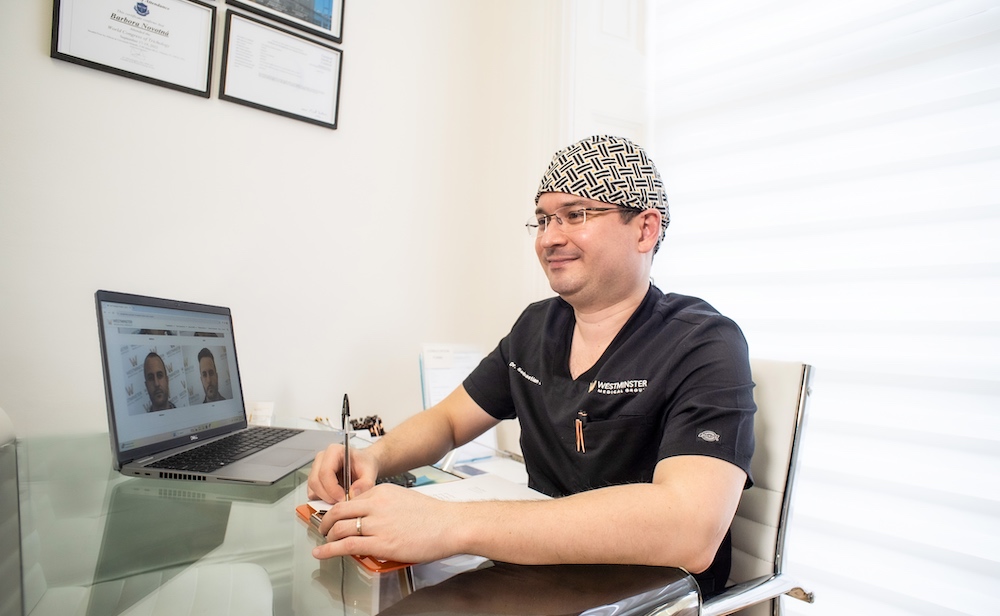- 134 Harley Street, London, W1G 7JY
As anyone who is experiencing hair loss knows, it is difficult to ignore the situation. When you start to learn about the treatments available, you will have many questions on the best course of action to take. To begin with, most of our clients phone in, submit a couple of photos of their case for the surgeons to assess, or book in for a free consultation at our Harley Street clinic in London.
Following your initial contact and assessment, it is best to come and meet one of our hair restoration surgeons. They will assess if you are a suitable candidate for hair transplant surgery, or if a non-surgical approach would be better suited to you.

Hair restoration surgery isn’t for everyone for several reasons including patient age, hair-loss pattern, available donor hair, and medical background.
To see if you’re a good candidate, a thorough examination is required to determine your overall health, current hair-loss pattern, family history of hair loss, what you would like to achieve personally, and how much donor hair you have available taking into account future usage of the safe zone region via FUE or FUT should you need to utilize this finite reserve of your donor hair later down the line.
Our hair transplant surgeons will listen to you carefully and ascertain what you would like to achieve before detailing the best options available given your specific case.
Following your consultation, you will receive a comprehensive summary, tailored to your case. We encourage you to take your time before making a decision and ask as many questions as needed, to make sure everything is clear before proceeding.
We also offer online consultations for those interested in ascertaining their options quickly. To begin with, please send over a few high-quality images of your current hair loss, including your donor hair, for examination. Once received, we will send you a questionnaire, so that our surgeon can assess your case, and determine which surgical or non-surgical solution is best suited to you before attending an in-person consultation.
On the day of your consultation, you will personally consult with our hair transplant surgeons registered with the General Medical Council (GMC) at our Harley Street surgical center in London, and not with a sales representative under pressure to close a deal for commission pay.
Researching hair transplant methodology is an important step to determine whether it is the right procedure for you. Take your time with finding a reputable hair transplant surgeon who has vast experience. Always check the credentials of your potential hair transplant surgeon, including their surgeon status, education, training, and certifications. Look at the before and after photos of previous hair transplant patients to get an idea of the quality of results you can expect.

Always read the surgeon’s online reviews from their previous patients to get an idea of their own experiences. Search online for information on hair transplant procedures, techniques, and patient accounts, and look for websites and forums that provide reliable and unbiased information on hair transplant surgery. Always schedule a consultation with the hair transplant surgeon directly to discuss your hair loss concerns and determine if you are a good candidate for the procedure.
Only a registered hair transplant surgeon can properly assess and advise which is the most suitable hair restorative option available, given your individual case. You will discuss the long-term planning and correct management of your available donor hair, taking into account the possible future usage of this precious finite region. You will discuss the goals that you desire, and the achievable options, whilst having a trusted and dedicated team to assist you with pre-operative and post-operative advice throughout should you decide to go ahead with treatment.



Book your free consultation with our expert hair surgeons directly.
Simply upload your photo below to discover if you’re a good candidate.

You’ll discover…
✅ Essential tips for hair care in the early recovery stages
✅ Must-know facts about hair shedding and growth cycles
✅ Transplant procedure costs
✅ How to handle work and social interactions after your procedure